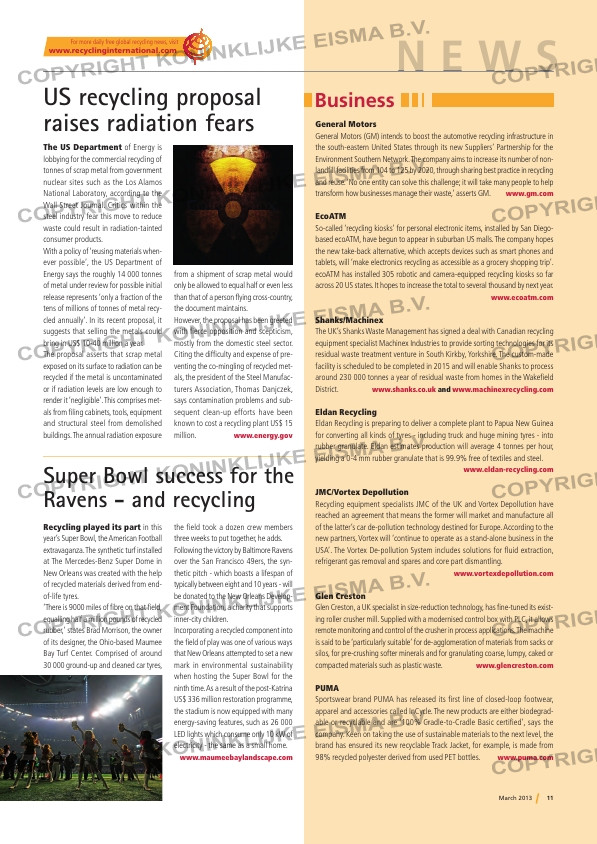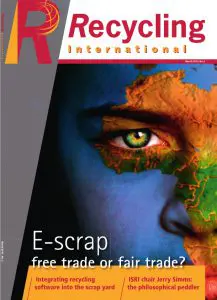Page 11 from: March 2013

Business
N E W S
11March 2013
For more daily free global recycling news, visit
www.recyclinginternational.com
Super Bowl success for the
Ravens – and recycling
Recycling played its part in this
year’s Super Bowl, the American Football
extravaganza. The synthetic turf installed
at The Mercedes-Benz Super Dome in
New Orleans was created with the help
of recycled materials derived from end-
of-life tyres.
‘There is 9000 miles of fi bre on that fi eld,
equalling half a million pounds of recycled
rubber,’ states Brad Morrison, the owner
of its designer, the Ohio-based Maumee
Bay Turf Center. Comprised of around
30 000 ground-up and cleaned car tyres,
the field took a dozen crew members
three weeks to put together, he adds.
Following the victory by Baltimore Ravens
over the San Francisco 49ers, the syn-
thetic pitch – which boasts a lifespan of
typically between eight and 10 years – will
be donated to the New Orleans Develop-
ment Foundation, a charity that supports
inner-city children.
Incorporating a recycled component into
the fi eld of play was one of various ways
that New Orleans attempted to set a new
mark in environmental sustainability
when hosting the Super Bowl for the
ninth time. As a result of the post-Katrina
US$ 336 million restoration programme,
the stadium is now equipped with many
energy-saving features, such as 26 000
LED lights which consume only 10 kW of
electricity – the same as a small home.
www.maumeebaylandscape.com
General Motors
General Motors (GM) intends to boost the automotive recycling infrastructure in
the south-eastern United States through its new Suppliers’ Partnership for the
Environment Southern Network. The company aims to increase its number of non-
landfi ll facilities from 104 to 125 by 2020, through sharing best practice in recycling
and reuse. ‘No one entity can solve this challenge; it will take many people to help
transform how businesses manage their waste,’ asserts GM. www.gm.com
EcoATM
So-called ‘recycling kiosks’ for personal electronic items, installed by San Diego-
based ecoATM, have begun to appear in suburban US malls. The company hopes
the new take-back alternative, which accepts devices such as smart phones and
tablets, will ‘make electronics recycling as accessible as a grocery shopping trip’.
ecoATM has installed 305 robotic and camera-equipped recycling kiosks so far
across 20 US states. It hopes to increase the total to several thousand by next year.
www.ecoatm.com
Shanks/Machinex
The UK’s Shanks Waste Management has signed a deal with Canadian recycling
equipment specialist Machinex Industries to provide sorting technologies for its
residual waste treatment venture in South Kirkby, Yorkshire. The custom-made
facility is scheduled to be completed in 2015 and will enable Shanks to process
around 230 000 tonnes a year of residual waste from homes in the Wakefi eld
District. www.shanks.co.uk and www.machinexrecycling.com
Eldan Recycling
Eldan Recycling is preparing to deliver a complete plant to Papua New Guinea
for converting all kinds of tyres – including truck and huge mining tyres – into
rubber granulate. Eldan estimates production will average 4 tonnes per hour,
yielding a 0-4 mm rubber granulate that is 99.9% free of textiles and steel.
www.eldan-recycling.com
JMC/Vortex Depollution
Recycling equipment specialists JMC of the UK and Vortex Depollution have
reached an agreement that means the former will market and manufacture all
of the latter’s car de-pollution technology destined for Europe. According to the
new partners, Vortex will ‘continue to operate as a stand-alone business in the
USA’. The Vortex De-pollution System includes solutions for fl uid extraction,
refrigerant gas removal and spares and core part dismantling.
www.vortexdepollution.com
Glen Creston
Glen Creston, a UK specialist in size-reduction technology, has fi ne-tuned its exist-
ing roller crusher mill. Supplied with a modernised control box with PLC, it allows
remote monitoring and control of the crusher in process applications. The machine
is said to be ‘particularly suitable’ for de-agglomeration of materials from sacks or
silos, for pre-crushing softer minerals and for granulating coarse, lumpy, caked or
compacted materials such as plastic waste. www.glencreston.com
PUMA
Sportswear brand PUMA has released its fi rst line of closed-loop footwear,
apparel and accessories called InCycle. The new products are either biodegrad-
able or recyclable and are ‘100% Cradle-to-Cradle Basic certifi ed’, says the
company. Keen on taking the use of sustainable materials to the next level, the
brand has ensured its new recyclable Track Jacket, for example, is made from
98% recycled polyester derived from used PET bottles. www.puma.com
The US Department of Energy is
lobbying for the commercial recycling of
tonnes of scrap metal from government
nuclear sites such as the Los Alamos
National Laboratory, according to the
Wall Street Journal. Critics within the
steel industry fear this move to reduce
waste could result in radiation-tainted
consumer products.
With a policy of ‘reusing materials when-
ever possible’, the US Department of
Energy says the roughly 14 000 tonnes
of metal under review for possible initial
release represents ‘only a fraction of the
tens of millions of tonnes of metal recy-
cled annually’. In its recent proposal, it
suggests that selling the metals could
bring in US$ 10-40 million a year.
The proposal asserts that scrap metal
exposed on its surface to radiation can be
recycled if the metal is uncontaminated
or if radiation levels are low enough to
render it ‘negligible’. This comprises met-
als from fi ling cabinets, tools, equipment
and structural steel from demolished
buildings. The annual radiation exposure
from a shipment of scrap metal would
only be allowed to equal half or even less
than that of a person fl ying cross-country,
the document maintains.
However, the proposal has been greeted
with fi erce opposition and scepticism,
mostly from the domestic steel sector.
Citing the diffi culty and expense of pre-
venting the co-mingling of recycled met-
als, the president of the Steel Manufac-
turers Association, Thomas Danjczek,
says contamination problems and sub-
sequent clean-up efforts have been
known to cost a recycling plant US$ 15
million. www.energy.gov
US recycling proposal
raises radiation fears
RI_2-NEWS.indd 11 06-03-13 14:29



